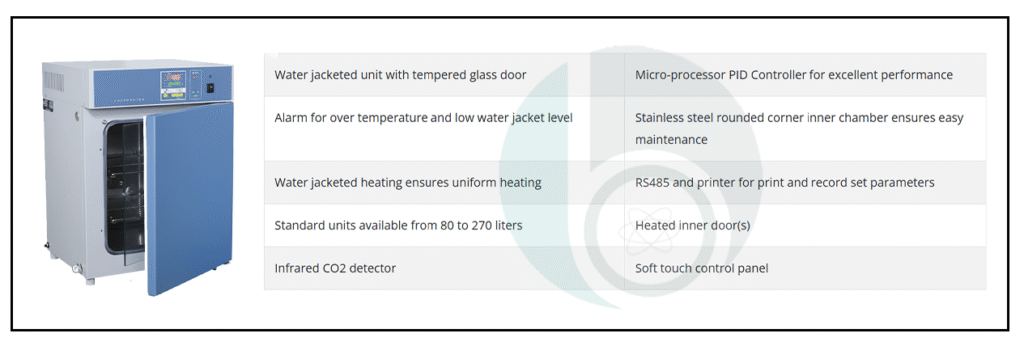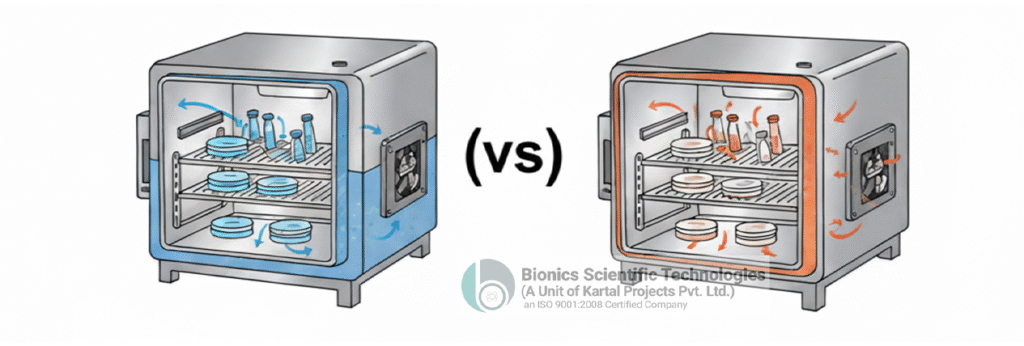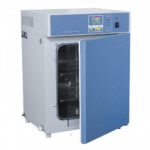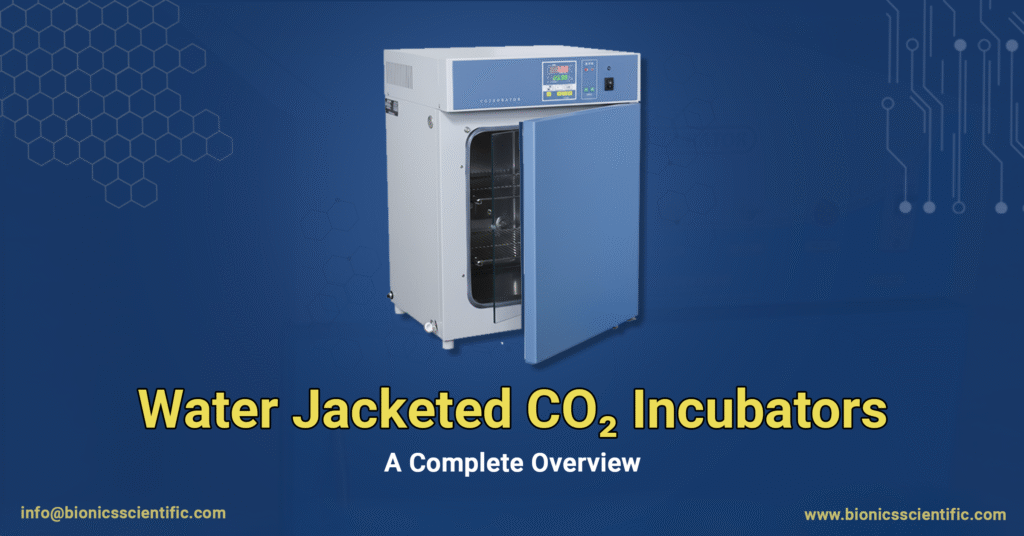In Labs From cell cultures to tissue samples to microbiology work the one thing which is non negotiable is the environment has to be just right. Even the smallest fluctuations in temperature or humidity can affect results. Thats why labs rely on CO₂ incubators which artificially create the body like conditions where cells need to grow.
Among many options the water jacketed CO₂ incubators have earned a reputation for their rock solid temperature stability. They are often the go to choice for delicate tasks like mammalian cell culture, tissue engineering and clinical research where reliability truly matters.
- What is a CO2 Incubator?
- What Makes Water Jacketed CO₂ Incubators Unique?
- How CO₂ Works in a Cell Culture Incubator
- Conclusion
- Frequently Asked Questions : FAQs about CO2 incubators:
- What is a CO₂ incubator and why does it becomes necessary for cell culture?
- How is a water jacketed CO₂ incubator different from an air jacketed one?
- Why is controlling CO2 concentration important inside the incubator?
- How often should maintaining or cleaning of CO₂ incubator has to be done?
- What are the advantages of having a CO₂ sensor inside the incubation chamber?
- Can I use a portable or benchtop CO₂ incubator for my lab?
- What makes Panasonic and Binder CO₂ incubators popular in research labs?
- How does a CO₂ shaking incubator enhance cell culture growth?
- What features should be looked for when purchasing a CO₂ incubator?
- How to ensure that CO₂ incubator prevents contamination?
- Bionics Scientific Technologies Pvt. Ltd CO2 Incubator Video
Ever wondered what makes a CO₂ incubator so essential in labs working with cells and tissues? In this blog, we dive into the fascinating world of water jacketed CO₂ incubators exploring how they work, their benefits, key types and real world applications.
We will also look at popular options like the Panasonic CO₂ incubator, Binder CO₂ incubator and air jacketed CO₂ incubator while touching on practical details such as CO₂ incubator price and features that matter most. Whether its for cell culture, tissue research or even a CO₂ shaking incubator, this guide brings everything together to help make sense of these vital lab tools.

What is a CO2 Incubator?
A CO2 incubator is a specialized chamber which is designed in a way that create the perfect environment for growing and maintaining cell cultures. It carefully regulates temperature, humidity and most importantly the carbon dioxide level which helps keep the culture medium pH stable through the bicarbonate buffering system. This balance is vital for healthy cell metabolism and long term viability.
Today, CO2 incubators have become a cornerstone of modern laboratories playing a key role in biomedical research, pharmaceuticals, microbiology, IVF, cancer studies and even agricultural sciences.
What Makes Water Jacketed CO₂ Incubators Unique?
Water jacketed CO₂ incubators have a simple but different design that is a layer of heated water surrounds the inner chamber. Thinking it of as a thermal buffer that keeps the temperature even and steady. Even when the door is opened, the water holds onto heat and prevents sudden drops. This makes them perfect for fragile cell cultures where consistent conditions are necessary for healthy growth and reliable results.
Searching for a reliable Water Jacketed CO₂ Incubator that is both ISO 9001 and CE certified?
Explore the certified range from Bionics Scientific. Our incubators are the go-to choice for labs where quality assurance performance, and temperature stability are non-negotiable. Contact our experts at info@bionicsscientific.com or call +91 9111161955 | 9376651333.
Benefits:
- Stable and uniform temperature : Keeps long term cultures healthy by maintaining suitable conditions.
- Prevents fluctuations : Reduces the risk of sudden temperature increase or drops that could harm sensitive samples.
- Gentle thermal gradients : Smooth heat distribution minimizes condensation and avoids hot spots inside the chamber.
Consideration:
Slower startup and heavier design : Because the water jacket takes time to heat up, it may take longer to reach the desired temperature and the unit is generally heavier than air jacketed alternatives.
How CO₂ Works in a Cell Culture Incubator
Think of CO₂ in the incubator as a helper that keeps cells comfortable almost like maintaining the perfect room temperature for them. When CO₂ mixes into the culture medium, it forms carbonic acid which keeps the pH balanced around 7.2 to 7.5 just like it would be inside the body. Most incubators maintain about 5% CO₂, creating an environment that feels natural to the cells.
Modern incubators come with infrared CO₂ sensors that constantly check and adjust the levels that makes sure everything stays just right. This kind of precise control is crucial for mammalian cell growth keeping cultures healthy and experiments
Bionics Scientific stands for excellence. We deliver high-performance, ISO and CE certified laboratory equipment engineered for precision and durability. Trusted by researchers worldwide, we are your dedicated partner in scientific innovation.
Types of CO₂ Incubators: Water Jacketed vs. Air Jacketed
CO₂ incubators generally come in two main designs: water jacketed and air jacketed each with its own strengths.
- Water Jacketed CO₂ Incubators has a heated water layer surrounding the chamber. This keeps the temperature very stable even when the door is opened. They are heavier and take a bit longer to heat up but the gentle thermal environment is ideal for delicate cell cultures.
- Air Jacketed CO₂ Incubators use electric heating elements to warm the air inside the chamber quickly. They are lightweight and portable, heat up faster and recover temperature quickly though the temperature is slightly less stable compared to water jacketed models.

Here’s a quick comparison:
| Aspect | Water Jacketed CO₂ Incubator | Air Jacketed CO₂ Incubator |
| Temperature Stability | High and stable even with door openings | Slightly less stable but warms quickly |
| Weight | Heavy due to water reservoir | Lightweight and portable |
| Heat Recovery Speed | Slower | Fast |
| Risk of Contamination | Possible stagnation in water jacket | Lower, easier to sterilize |
| Cost | Usually higher due to complex design | Generally lower |
Specialized CO₂ Incubators and Their Unique Features
Not all CO₂ incubators are the same but some are designed for specific lab needs:
- CO₂ Shaking Incubator : Combines CO₂ control with gentle shaking which helps keep cells or microorganisms suspended and aerated that is perfect for suspension cultures.
- Tissue Culture Incubator : Tailored for plant or animal tissue cultures with precise temperature and humidity control to keep delicate tissues healthy.
- Stackable CO₂ Incubator : Designed to maximize lab space by allowing multiple units to be stacked each with independent controls.
- Non-CO₂ Incubator : Ideal for experiments that don’t require CO₂, but still need precise temperature and humidity control.
Each type is built to meet different research requirements which gives labs the flexibility to choose the right incubator for the work at hand.
Applications of Water Jacketed CO₂ Incubators
Water jacketed CO₂ incubators are versatile tools that has uses across a variety of research and clinical settings:
- Mammalian Cell Culture : Widely used in biomedical and pharmaceutical research.These incubators provide the stable environment sensitive mammalian cells need to thrive.
- Cell Research : Perfect for experiments in tissue engineering, stem cell studies and cancer research where consistent conditions are necessary for reliable results.
- Tissue Culture : Supports the growth of plant and animal tissues maintaining the right temperature and humidity for healthy development.
- IVF Laboratories : Critical for embryo culture which ensures stable physiological conditions that can impact success rates.
- Microbiology and Infectious Disease Labs : Work well for growing microorganisms that require precise CO₂ levels and humidity control.
These incubators are trusted wherever stable and controlled environments are necessary for research or diagnostics or clinical applications.
Keeping a CO₂ Incubator in Top Shape
Maintaining CO2 incubators is essential for reliable and durable performance but only if its cared properly:
- Regular cleaning and sterilization to avoid contamination.
- Monitoring and refilling incubator humidity reservoirs.
- Check and calibrate CO2 sensors regularly for accuracy.
- Replace HEPA filters in units that include air filtration.
- Avoid frequent door opening to maintain humidity and temperature stability.
- Monitor and maintain alarms and digital controllers.
Searching for a reliable Water Jacketed CO₂ Incubator that is both ISO 9001 and CE certified?
Explore the certified range from Bionics Scientific. Our incubators are the go-to choice for labs where quality assurance performance, and temperature stability are non-negotiable. Contact our experts at info@bionicsscientific.com or call +91 9111161955 | 9376651333.
Buying Guide: CO₂ Incubator Price and What to Consider
The price of a CO₂ incubator can vary quite a bit depending on several factors: the size of the chamber whether its water jacketed or air jacketed extra features like HEPA filters or UV sterilization, and the brand reputation.
For smaller labs, a benchtop or portable incubator is often enough and comes at a lower price point. Larger research facilities, on the other hand may opt for multi chamber or units to handle more samples at once.
The key is to balance budget with your lab’s specific need making sure the incubator can support reliable and consistent growth for the types of cells or tissues being cultured.
Conclusion
Water jacketed CO₂ incubators are still the ideal options for labs that requires steady and reliable conditions for long term cell growth. They provide a stable and supportive environment for everything from mammalian cell cultures to tissue engineering and shaking incubators.
By Knowing the differences between water and air jacketed incubators and about their features with pricing options helps researchers to pick the best fit for their work. Choosing the right incubator not only protects sensitive cultures but also makes daily lab work smoother and more efficient. Apart from Air Jacketed and Water Jacked, we have several more types of CO2 Incubators manufacturing some of them are Orbital Shaker CO2 Incubators, Mini CO2 Incubators, CO2 Incubators with UV Sterlization
Frequently Asked Questions : FAQs about CO2 incubators:
What is a CO₂ incubator and why does it becomes necessary for cell culture?

The growth of biological cultures is essential to life science research – from creating new pharmaceuticals to studying basic cellular functions. CO₂ incubators are the precision instruments critical to making this happen. These instruments are very different from chicken farm incubators. CO₂ incubators are specially designed to create and sustain the strict environments that cell and tissue cultures require to flourish.
These instruments function primarily on the principle of control. Specific cells and cell cultures require different growth parameters and particular adjustments in temperature, humidity, and gas composition. A precise, sterile environment must contain the right mixture of cell culture gases. Failing to do this, even marginally, will lead to the uselessness of entire experiments – and tons of wasted time, effort, and resources. This is why regulating the proportions of carbon dioxide in incubators is of utmost importance.
How is a water jacketed CO₂ incubator different from an air jacketed one?
Water jacketed incubators surround the chamber with heated water which offers advance temperature stability and uniformity. Air jacketed incubators heat the air directly so they warm up faster but temperatures can fluctuate slightly more.
Why is controlling CO2 concentration important inside the incubator?
CO2 helps in regulating the pH of the culture medium via the bicarbonate buffering system. This creates an environment similar to physiological conditions which is important for proper cell viability and metabolism.
How often should maintaining or cleaning of CO₂ incubator has to be done?
Regular maintenance is most important. From Cleaning to sterilization to sensor calibration and filter replacements are usually done monthly or as recommended by the manufacturer to prevent contamination and ensure accuracy.
What are the advantages of having a CO₂ sensor inside the incubation chamber?
A built in CO₂ sensor provides rea -time, precise measurements even under humid and warm conditions.It ensures rapid response and accurate CO₂ control also keeping cultures stable.
Can I use a portable or benchtop CO₂ incubator for my lab?
Yes,Portable and benchtop models are space saving and flexible which is perfect for smaller or mobile labs while still offering precise control for cell culture.
What makes Panasonic and Binder CO₂ incubators popular in research labs?
Both brands are known for durability, user friendly interfaces, reliable temperature and CO₂ control plus innovative safety and contamination prevention features.
How does a CO₂ shaking incubator enhance cell culture growth?
It combines both controlled CO₂ and temperature with subtle shaking or agitation which improves gas and nutrient exchange especially for suspension cultures and microbial growth.
What features should be looked for when purchasing a CO₂ incubator?
Main features like precise temperature and humidity control plus rapid recovery plus internal sterilization options plus accurate CO₂ sensors and energy efficiency.
How to ensure that CO₂ incubator prevents contamination?
Choose models with hot air sterilization, easy to clean interiors, HEPA filters, minimal dead space and follow regular maintenance protocols including optional UV disinfection.
Bionics Scientific Technologies Pvt. Ltd CO2 Incubator Video
Explore our complete guide to ICH Q1B photostability testing.
https://www.bionicsscientific.com/blog/photostability-test-chamber/
Class II Biosafety Cabinets: The Complete Selection & Safety Manual.
https://www.bionicsscientific.com/blog/class-ii-biosafety-cabinet-guide/

